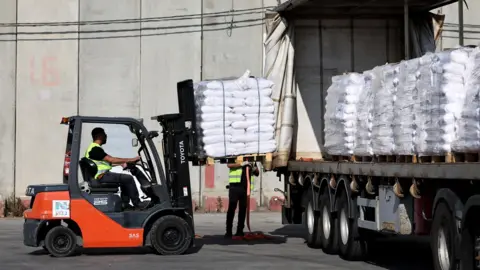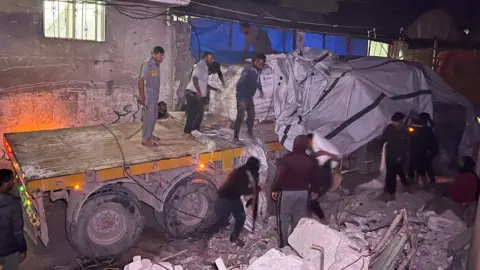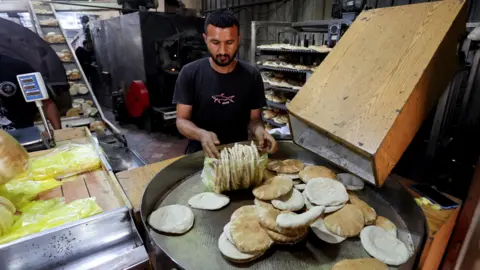
[ad_1]
 EPA
EPAMore than 90 shipments of humanitarian aid were collected by the United Nations teams inside the Gaza Strip, three days after Israel alleviated the siege for 11 weeks.
The aid, which included flour, children’s food and medical equipment, was captured from the Kere Shalom crossing on Wednesday evening and was transferred to distribution warehouses. The pictures showed a bakery producing bread with some flour.
The United Nations said that the delays were due to the insecurity along the road to the individual arrival approved by the Israeli army.
The Israeli authorities said they had allowed a large group of truck via Kerem SHALOM on Wednesday. However, the United Nations said it “is not close enough to meet the extensive needs in Gaza.”
Humanitarian organizations have warned of acute levels of hunger between 2.1 million, amid a large shortage of basic foods and high prices.
Palestinian Health Minister Majid Abu Ramadan, who is located in the occupied West Bank, told the reporters in Geneva on Thursday that 29 children had passed away due to “hunger -related” reasons in the past two days, according to Reuters news agency.
A rating by the classification of the non -subsidized integrated food security (IPC) also said that half a million people are facing hunger in the coming months.
On Wednesday night, a UN spokesman said its teams “collected about 90 trucks of goods from Kerem shalom crossing and sent it to Gaza.”
A joint video clip with BBC showed trucks with aid collected from Karim Shalom’s leadership in a convoy along a road in southern Gaza.
Other shots showed flour bags that are discharged in a bakery and hundreds of beta bread coming out of their ovens on transport belts.
Amjad Al -Shawa, director of the Palestinian NGO Network in Gaza, said that the bakeries supported by the United Nations World Food Program (WFP) will produce bread that the agency’s employees will be issued.
“The idea is to try to reach the most needy families, those who are desperate, because it is just the beginning,” he told Reuters.
ICRC said it had brought one load of medical supplies to a field hospital in the southern city of Rafah, but more was needed.
She said: “A group of trucks is sadly insufficient. The rapid flow of fast and sustainable aid can begin to address the scope of full needs on Earth.”
 Reuters
ReutersBefore the operation, Antoine Renard told the World Food Program at the BBC that the problems of collecting aid had arisen because the Israeli army wanted trucks to move along a road in Gaza, the relief agencies are dangerous. He said that the road could leave them at risk of attacks by hungry civilians and armed criminal gangs.
“At the prices of the market in Gaza at the present time, the value of each truck filled with flour is about 400,000 dollars (298,000 pounds),” said Mr. Renard.
He added that the solution will be “hundreds of daily trucks” that travel along a safe road to warehouses, indicating “the more we say, the more danger and more anxiety” among the population.
Mr. Renard said that the relief agencies by Gaza did not employ armed guards to accompany their shipments because they were very dangerous, so there was an urgent need for a long suspension and an extension of the current window for five days to transport food.
Israel stopped all delivery operations from aid and commercial supplies to Gaza on March 2 and resumed its military attack after two weeks, and ended the two -month ceasefire with Hamas.
She said that the steps were aiming to pressure the armed group to release 58 hostages, who were still detained in Gaza, up to 23 of them alive.
Israel also insisted that there was no shortage of aid and accused Hamas of stealing supplies to provide it to its fighters or selling money – a claim that the group denied.
The United Nations also denied that aid was transferred and said that Israel was bound under international humanitarian law to ensure food and medicine from Gaza residents.
On Wednesday, Israeli Prime Minister Benjamin Netanyahu said that it allows a limited degree of food in Gaza so that the Israeli army can continue its newly expanded land attack and control the Palestinian territories.
“At the end of this maneuver, all the Gaza Strip will be under the control of Israeli security and Hamas will be fully defeated,” he said at a press conference.
“In order to preserve our operational freedom, and allow our best friends to continue our support, we need to prevent a humanitarian crisis.”
Netanyahu also said that the controversial plan in the United States of Israel to assist in Gaza – which would overcome the current United Nations facilities and use a private food distribution company from the centers in the south and central Gaza protected by security and Israeli -forces – Israel will give “another tool to win the war.”
 Reuters
ReutersThe United Nations and other agencies said that it will not cooperate with the plan, saying that it contradicts the basic humanitarian principles and it seems to be “help in a weapon.”
Language programming has also warned that it would force 2.1 million people to travel long distances.
“This plan is not a solution, it is a political decision,” said Mr. Renard. “Food should go to people, not people on food.”
Meanwhile, Israeli bombing and land operations continue throughout Gaza, as the Hamas Ministry of Health has informed on Thursday that 107 people have been killed over the past 24 hours.
At least 52 people have been killed since dawn on Thursday, according to the Hamas Civil Defense Agency. The Palestinian media reported that it included 16 people, most of whom are members of an extended family, who died when a house was injured in Gabalia, in northern Gaza.
The Israeli army issued the evacuation orders for Japalia and another 13 north neighborhoods on Thursday, and the residents warned that “working with an intense force in your areas, as terrorist organizations continue their activities and operations.”
According to the United Nations, about 81 % of the region are now subject to Israeli evacuation orders or are located in the “No-G” military areas.
It is estimated that nearly 600,000 people have been displaced again since March, including 161,000 who were forced to flee last week.
Israel launched a military campaign in Gaza in response to the Hamas attack on the border on October 7, 2023, where about 1,200 people were killed and 251 others were taken into account.
At least 53,762 people have been killed, including 16,500 children, in Gaza since then, according to the Ministry of Health in the region.

